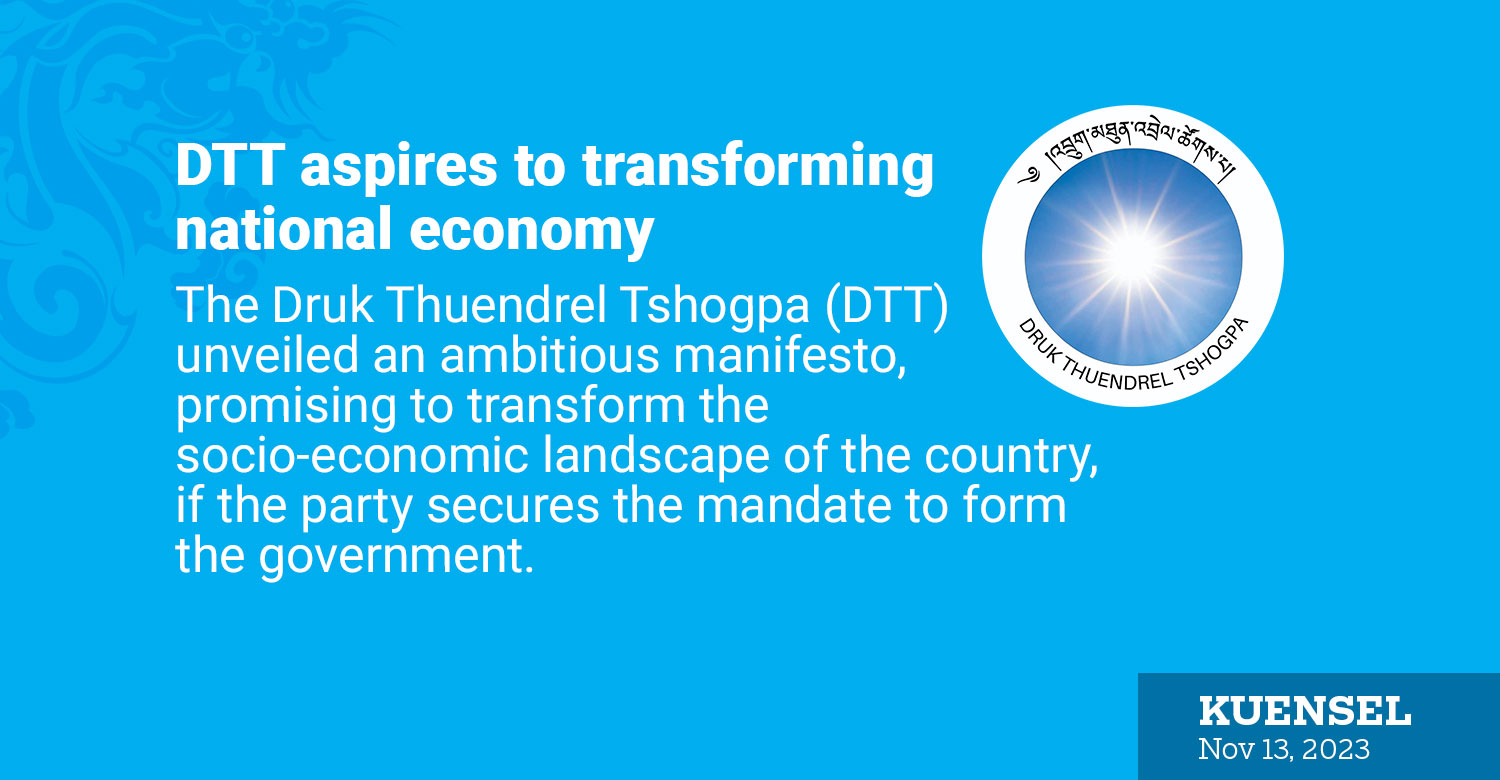Lhakpa Quendren
The Druk Thuendrel Tshogpa (DTT) unveiled an ambitious manifesto, promising to transform the socio-economic landscape of the country, if the party secures the mandate to form the government.
With a commitment to economic development, social progress, security, governance, and tackling cross-cutting issues, the party promises to secure a stable future for every Bhutanese as they prepare for the upcoming National Assembly elections.
The pledges, according to the party, were designed to align with the SMART (specific, measurable, achievable, relevant, and time-bound) after nationwide public consultations, and the collective wisdom of the people.
DTT’s manifestoes in detail here!
Economy
The party promises to prioritise the mining sector and increase its contribution to the gross domestic product (GDP) to Nu 15 billion by 2028 and create 2,000 new jobs.
According to the party, it can be achieved by allowing foreign direct investment (FDI) in mines and ensuring that the benefits are shared among the government, investors, and the people affected.
To address the rising costs and uncertainties in supply of sand and stones, DTT pledges to start sand and stone quarries and outsource river dredging and protection works to the private sector.
DTT pledges to solve timber-related issues to boost the forest-based economy. Allotting 5,000 cubic feet of rural timber to every rural household for building homes on khimsa land is among their pledges.
A key highlight of DTT’s pledge is to construct four mega hydropower projects and develop four small hydroelectric projects.
Agriculture and tourism
The party’s flagship programmes promises to bolster the agricultural sector by providing all-weather farm roads, improved access to water sources, and addressing human-wildlife conflicts.
Introduction of a cargo ropeway from Phuentsholing to Damchu and light mono-rails for rural areas and provide commercial helicopter and domestic flight services stand out among their pledges.
DTT commits to constructing 500km of new national highway-standard roads and upgrading 200km of existing highways.
The party’s pledges include establishing three new startup centers, and streamlining land lease procedures for industrial activities in collaboration with local governments to promote CSIs based on local resources and skills in different regions.
DTT promises to revive tourism by retaining a daily sustainable development fee (SDF) for regional tourists, setting clear SDF rates, and encouraging marketing consistency.
DTT pledges to implement the SMART city concept in small cluster villages like Laya and Bardo Trong within year.
Social progress
DTT pledges to revamp the education sector focusing on STEM subjects. DTT pledges to provide annual grants to schools, healthy mid-day meals to students, and establish State-of-the-art STEM schools in each dzongkhag.
The party also pledges to enhance technical and vocational education and early childhood care and support people with disabilities, non-literate adults, and youth.
To improve healthcare quality and accessibility, DTT pledges include disease prevention, training more nurses, promoting traditional medicine, and outsourcing support services.
DTT commits to a minimum of 30 percent female candidate representation, reducing gender-based violence, and establishing a Gender-Based Recruitment System in government agencies.
DTT pledges to establish international-standard TVET programmes, provide logistics for overseas youth, education loans for TVET scholarships, and create incentives for Bhutanese abroad to invest at home.
For children in conflict with the law, the party pledges to establish designated shelters and support centers for these children and implement reintegration programmes for ex-juveniles and recovery groups.
DTT pledges to establish vocational campuses, support private organisations, and provide special employment schemes to support people with special needs and the LGBTIQ community.
DTT pledges to provide better care for the aging population by establishing old-age care centers and supporting private organisations and NGOs for senior citizens.
Security
DTT promises to raise the GDP contribution of agriculture from Nu 19.75 billion to Nu 30 billion and livestock from Nu 10.72 billion to Nu 15 billion.
The agriculture-focused initiatives, including access to farm inputs, greenhouse establishment, labour support, and international farming ventures are estimated to cost the government about Nu 4.89 billion.
Governance
DTT has various pledges aimed at addressing issues related to governance, planning, and execution of development activities, with a focus on reducing wasteful expenditure and enhancing efficiency.
The party pledges to convert Lhengay Densa into Zhabto Densa, replace 75 government cars with electric ones, move 10 agencies to dzongkhags, and divest loss-making State-owned enterprises (SoEs).
DTT pledges salary revision for civil servants, promotion of affordable housing, and an increase in the pension scheme option.
Members of Parliament (MP) will have offices in their respective constituencies.
Cross-cutting issues
The Royal Bhutan Police will be the main disaster management agency, reduce road right of way from 50ft to 20ft, offer skill programs to village youth and farmers, and facilitate low-cost modular housing for low-income individuals if DTT is elected.
The pledges also involve establishing four regional sporting centers, implementing professional or scholarship programs in sports, promoting national sporting activities through decentralised local grants, enforcing mandatory waste segregation in major towns, and establishing composting and organic waste management centers.
Besides raising USD 1 billion for climate initiatives, the party pledges to register two annual projects in global carbon markets, leading in global climate governance, partnering with carbon markets, establishing the Bhutan Climate Fund, allocating 10 percent of tourism SDF for cultural grants, and establishing a cultural museum if elected.
Sustainable development and good governance pledges include ensuring universal internet access, standardising products for small industries, and enhancing resource mobilization for CSOs.


